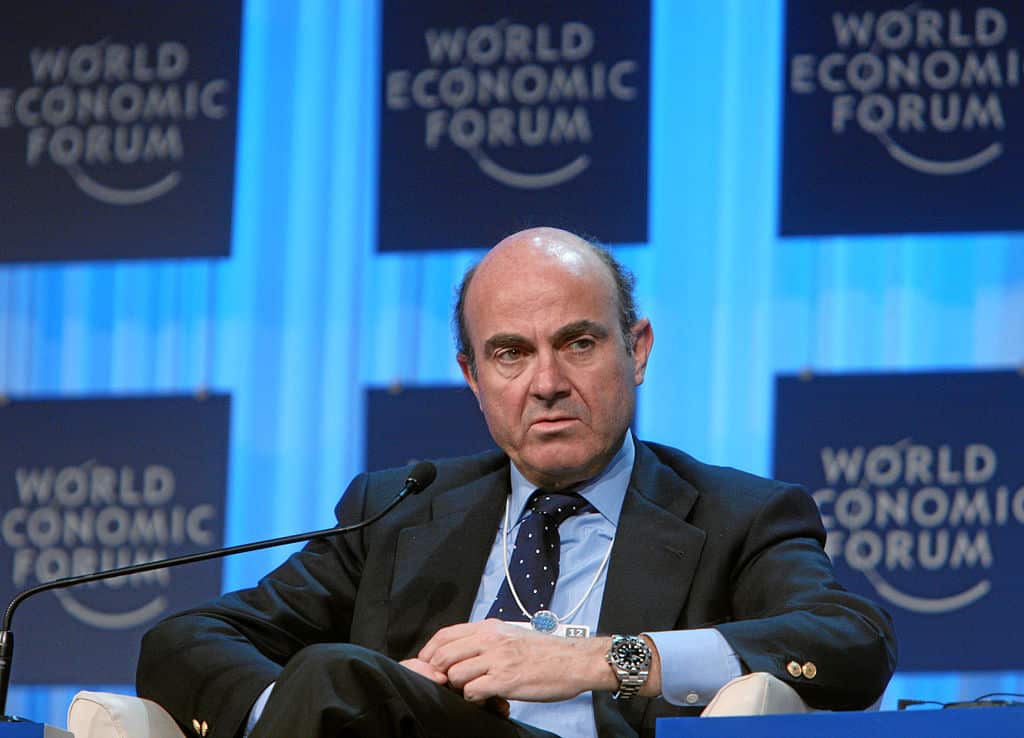Interview with Luis de Guindos, Vice-President of the ECB, conducted by Petri Sajari on 24 November 2020
28 November 2020
What are the key risks for the euro area recovery at the moment?
The fourth quarter of 2020 will be marked by the measures taken by euro area governments to deal with the new wave of coronavirus (COVID-19) infections that started after the summer. While these containment measures are generally not on the same scale as those taken in March or April, they will have an impact on the economy. We had a welcome surprise in the third quarter, but our quarter-on-quarter growth projection for the fourth, which was slightly above 3%, will not be met. Looking at leading indicators such as the purchasing managers’ index, negative quarter-on-quarter growth is now the most realistic scenario for the end of the year.
The main issue in the near future will be the availability of the vaccine and the precise details of how and when it is to be rolled out. The news is having a positive impact on market sentiment, but the implementation of the vaccine warrants our attention. Hopefully, a very high percentage of the population will soon be vaccinated and the nightmare of this pandemic will begin to draw to a close.
According to the International Monetary Fund, the pandemic will have the largest impact on the eurozone economy. What do you think the long-term damage of this crisis will be?
There are indeed factors that cause concern. The first long-term consequence of the pandemic is that public debt-to-GDP ratios will increase by between 15 and 20 percentage points. Similarly, leverage in the private, mainly corporate, sector will also increase. And there is a risk, which we need to avoid, of long-term scars in the labour market. Currently we see a decoupling between the drop in economic activity and the evolution of the labour market, i.e. unemployment levels have not risen by as much as you would expect with such a deep decline in activity. This is because the temporary work schemes implemented by governments across Europe are avoiding a sharp increase in unemployment.
We believe the economy will start to recover in 2021 and continue its revival in 2022. It will be essential that those who are currently on furlough schemes continue to belong to the labour force, and that those who have lost their jobs can rejoin the labour market. We can then not only recover the level of economic activity we had before the pandemic, but also the level of employment.
If the crisis gets worse, which now seems inevitable, what more will the ECB be able to do?
As I’ve mentioned, the fourth quarter will be worse than forecast, but the medium-term outlook – mainly because of the ray of hope brought by news of the vaccine – looks brighter. However, when we assess our instruments we do not only look at economic output. We also look at the evolution of inflation, which is our primary mandate. Inflation will be negative until the end of the year and we expect that it will turn positive next year because some drivers of this negative inflation will be reverted, for instance the reductions in value added tax or the sharp decline in oil prices caused by the lack of economic activity. All in all, we expect inflation to be close to 1% in 2021 and to see it moving up towards 1.2% or 1.3% in 2022.
As President Lagarde indicated after the last Governing Council meeting, we will recalibrate our instruments in December and this recalibration mainly involves our targeted longer-term refinancing operations (TLTRO), which is an instrument to inject liquidity into the banking sector, and the pandemic emergency purchase programme (PEPP), which right now comprises an envelope of €1.35 trillion to be implemented until mid-2021.These are the two main tools if the situation gets darker, although the arrival of the vaccines brings hope regarding the medium-term outlook.
Is there a risk that low interest rates, combined with the asset purchase program and the PEPP, are creating zombie companies that would not have survived under normal financial conditions and are therefore an obstacle to creative destruction?
The interest rate environment is not only a consequence of monetary policy decisions. It is also the consequence of a combination of other factors, such as globalisation, digitalisation and demographics. These have made the natural interest rate, which is a real variable rather than a monetary variable, decline over time. This, combined with very low inflation expectations, has created a situation where nominal interest rates, which are the ones we observe in the markets, are very low. But this is not only a result of monetary policy – it also reflects a decline in the natural interest rate.
Furthermore, low rates have been very useful in sustaining economic activity. Without them, the process would most likely not just have been one of creative destruction but one of simple destruction of companies and a decline in GDP.
Some might also say that the high debt levels in the economy will lead to zombie banks and zombie companies that constrain growth because of extraordinary debt burdens. What is your assessment of this?
As I mentioned earlier, there will be a legacy of debt after this crisis, in both the public and the private sector, and we will have to take this into consideration. But there is no alternative in the short term. The first line of defence against the consequences of the pandemic has been, and had to be, fiscal policy. The alternative – doing nothing – would have had much worse consequences in the short term and also in the medium and long term.
Regarding private debt, when you experience a decline in revenues as substantial as that experienced by many European companies, you need to try to bridge the gap and survive until the pandemic is over. And to do that you need to take on debt. There’s no alternative. Once the pandemic is over, issues such as fiscal sustainability and private lending will come to the fore, but in the short term there is no alternative.
Let’s move to the banking system. What are the main vulnerabilities in the eurozone banking system?
European banks have more capital and are more liquid and resilient than before the global financial crisis. But their weak point is very low profitability, which is reflected in very low valuations. This is not trivial, as it has an impact on their capacity to raise capital in the markets or generate it organically. It also makes it challenging to achieve an adequate level of provisioning that is in line with developments in the economy. Profitability was already the key weak point before the pandemic, and the crisis has aggravated it. Banks will also suffer a decline in revenues and the level of non-performing loans (NPLs) will go up. We expect the bulk of the NPL wave to come in the first half of next year.
Do you believe there will be consolidation via mergers and acquisitions in the eurozone banking sector?
We have started to see some consolidation, for instance in Italy and Spain. So far it’s domestic consolidation. It would be good if we also saw some cross-border consolidation. Consolidation is not a target in itself, but it could be a way to reduce excess capacity and costs.
The ECB started its asset purchase programme in early 2015 and abandoned it in late 2018. In autumn 2019, it was started again, but inflation remains very low. What are the key factors behind this extraordinarily low inflation?
Both headline and core inflation have been low over the last ten years and, as I mentioned, there are some structural factors, such as digitalisation, globalisation and demographics, that help explain why. In 2015 and 2016, there was a clear risk of deflation and the ECB acted to avoid it and to anchor inflation expectations. It remains to be seen what will happen with some of these factors. For instance, globalisation will likely not be as intense as it has been in recent decades, as the pandemic could make value chains more regional, which might have an impact on inflation. However, according to our projections inflation will remain low, and we will therefore keep monetary policy accommodative so that inflation can converge to our medium term aim.
In July 2020 the European Union introduced a recovery plan worth €750 billion. What is your take on that? Is there a risk that States may use it in a manner that does not promote structural changes?
The Next Generation EU fund is a very positive response, not only because of its size but also because it sends a very clear signal of the common willingness to defend Europe and the euro area. And regarding the funds, indeed, it’s not about spending but about spending properly, through programmes that can transform the European economy and accompany the structural reforms needed to improve productivity and enhance competitiveness. The European Commission will monitor this spending. If this money is not spent properly, we will be missing a great opportunity to make the European economy greener, more digital and more competitive.
Since introducing the PEPP in March, the ECB has definitely been able to calm the markets, but many people might still wonder how the programme has supported the real economy and households. What is your answer?
Calming the situation in the sovereign debt markets also brought reassurance to other markets, which has had a positive impact on the financing conditions that banks offer to their clients, households and companies. By avoiding fragmentation in the sovereign debt markets, we also avoided a credit crunch. Furthermore, PEPP also includes corporate sector purchases such as bonds or commercial paper.
Do you believe the attitude towards public debt has changed for good? Or is this change temporary, based on the fact that extraordinary times require extraordinary actions to support the economy?
Fiscal policy has to be the first line of defence, and fiscal deficits will be the consequence of the measures that governments have taken and will continue to take to address the impact of the pandemic. Public expenditure has to focus on the pandemic, for instance on furlough or public guarantee schemes, healthcare, etc. As a result, we will see larger public debt ratios. But in the medium term, once the pandemic is over, the situation will need to be addressed to ensure the sustainability of public finances.
So, basically, your answer is that you don’t believe that there has been a major shift in attitude towards public debt?
The big change is that the pandemic has caused a public health crisis which demanded a fiscal response. There was no alternative and, in the medium term, we will see higher public debt ratios. We will have to deal with that once the pandemic is over.
The response to this crisis has been quite different from what it was ten years ago, when the eurozone crisis began, because then the constant narrative was that we cannot allow public debt to increase.
This time is different. This crisis hasn’t been triggered by banks or financial stability troubles, as was the case in 2008. This is an exogenous shock of a magnitude we have not seen since the end of the Second World War. The policy response was the only one available: fiscal measures as the first line of defence, accompanied by monetary policy. Not acting rapidly on the fiscal side would have provoked an even deeper decline in GDP, and fiscal policy would also have had to react to that.













